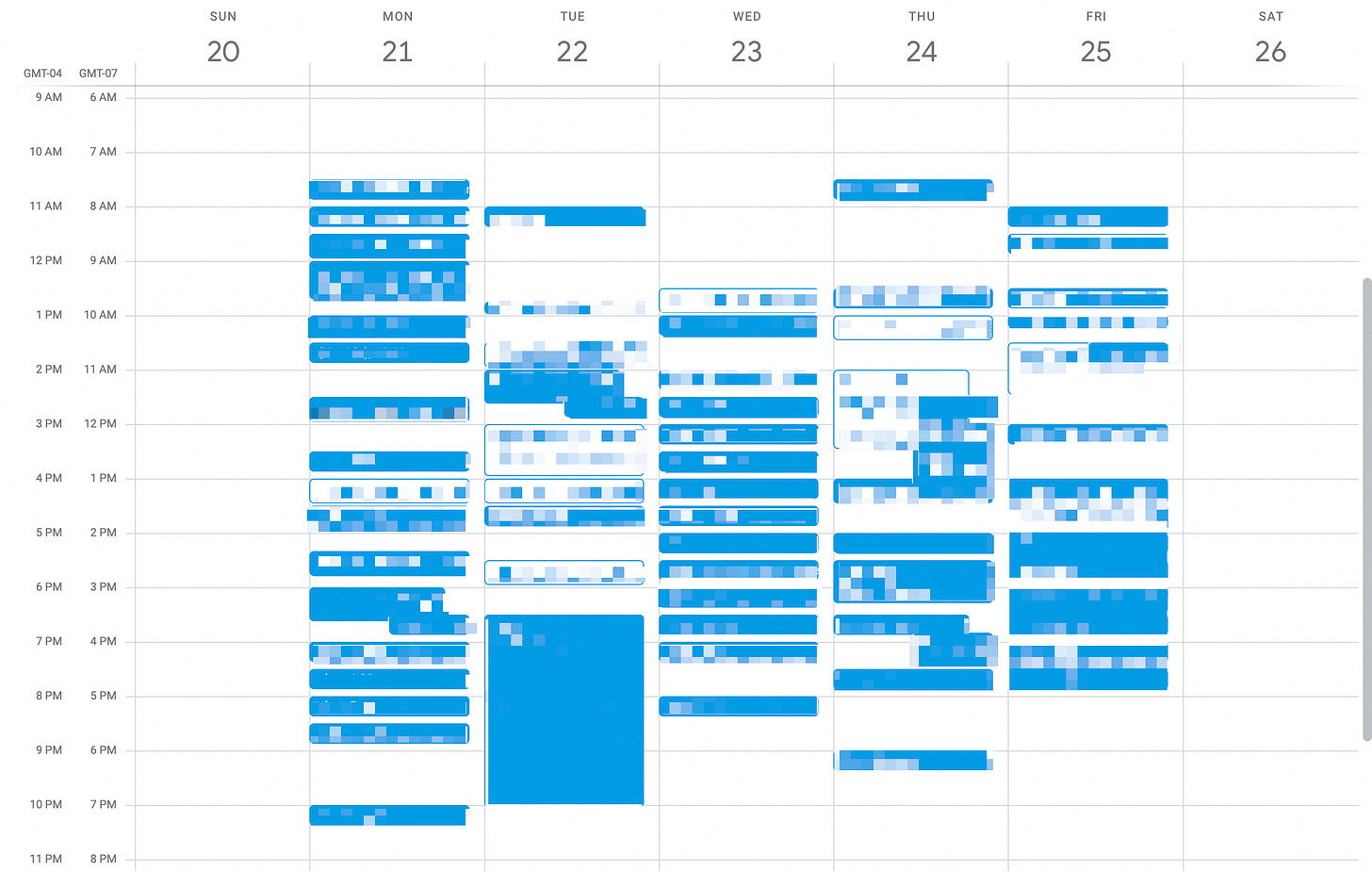Meetings suck. Let's fix it?
how to reclaim your time and build an anti-meeting culture + specific things that worked for me
¨If a person gave away your body to some passerby, you’d be furious. Yet, you hand over your mind to anyone who comes along, so they may abuse you, leaving it disturbed and troubled — have you no shame in that?¨ Epictetus
To the Stoics, the fact that we give up our mind and our time is a tragedy. How powerful is that quote?

Let’s talk about meetings1 and let’s not bury the lead - here’s the TLDR:
Most meetings suck. They kill creativity, break flow, and are often poorly run.
Create an anti-meeting culture from the ground up. Protect that culture.
When you do have meetings - be thoughtful about how to get max value out of them
Do whatever you need to do to get to at least 1 block of building time per day - ideally 2 blocks. Align your blocks with your energy levels, focusing on the toughest tasks when you have the highest energy.
Avoid being along for the ride. Take control of your time.
Internet is full of advice, productivity porn, wisdom 🧵s. This email is no different. Just words on a page. Question is how we act on this info.
Why do meetings suck? You and I read all the same blogs and tweets. You probably had meetings about why meetings suck. After reflecting on this for years - I boil it down to 3 reasons:
Killer of creative work. Killer of real work. Most meetings isn’t building products or growing the business.
Break flow. Create context switching. This is hard for builders and slows everyone down.
Poorly run.
So what can we do about it?
First, create an anti-meeting culture:
Values trickle down from the top. You and your leadership need to be anti-meeting. Then you reinforce and you recruit people who also like building rather than pontificating on zoom about building.
Create a writing first and a reading first culture. Hire for this. Focus on good written communication with ambient signaling and max empathy. What is ambient signaling? Think through the POV of your teammates. Take an extra minute to give more context. Help people see around corners. And try async video (i.e. loom or slack native video recorder is great to break down a feature or give context to your writing).
Set up clear written guides and norms within the team. This is how we do meetings if we do them. This is how we communicate in writing. This is our philosophy and here’s why. Repeat this.
Think deeply about how you spend your time. Do not be along for the ride. You know that feeling when you worked all day and you are not sure where the time went? And then you are low energy and it’s the next day? Take 1 action to free yourself up.
What are examples of some of these cultural norms?
Be wary of (1) recurring status update meetings and (2) individuals who are excited about meetings or seem to want to do meetings.
If not adding value in meeting and/or not learning - give feedback to meeting organizer and/or leave.
Have a desired outcome for each meeting. What do we want to achieve when it ends? If its to inform or align - fine. Ideally it’s to get to a decision.
Send agenda and/or pre-read ahead of meeting. If someone put in the time to share info ahead of meeting - take the time to read and think through it. Unless there is time allotted specifically to study the pre-read during the meeting (think Amazon) - don’t do it during the meeting. It’s rude and not fair to those who read beforehand.
Avoid multi-tasking during a meeting. Be present. People notice when we multitask on zoom and it creates all kinds of negative externalities, especially if it’s coming from leadership.
Be selective about attendance. Easier to make a call in smaller group. And yes, we need to balance being inclusive, but you can inform everyone in writing after.
If someone invited you to a meeting and you wonder if you should be there - ask. Don’t blindly accept. If there is a meeting without agenda or clear goals - ask and/or politely say no (more on that later). Somewhere we normalized plopping meetings on people’s calendars without context. I think that’s broken and it’s okay to take a stance.
If you are running a meeting - share notes in writing after. This is important because it’s rooted in bringing the team along and in the empathy/written culture we talked about. Some folks are better thinkers async while others couldn’t make it or weren’t invited. Write it down and share in the open.
A generalized mapping of meetings that are and aren’t okay:
Okay = all hands (!), well run stand-ups, meetings to deal with pressing issues or to pounce on opportunities, select 1v1s
Not okay = everything else
Specific strategics that worked for me
Protect the builders. Act as meeting-umbrella and take the brunt of mandatory calls.
Don’t do recurring 1v1s with direct reports. Instead build meaningful relationships and trust daily. There are many ways to do a good 1v1, but most often they turn them into status reports. A standing 1v1 is also not an excuse for lack of meaningful relationship with a teammate.
Only consistent recurring high-value meetings are all hands and 5min stand-up for the products that I am responsible for.
No busy/personal blocks. Ever. I never block time on my calendar for work or for personal stuff. Let the calendar be open and then deal with consequences when my time is needed.
Batch meetings to avoid context switching
“People are frugal guarding their personal property; but as soon as it comes to squandering time they are most wasteful of the one thing in which it is right to be stingy”
― Seneca
What didn’t work? Again 2 things
All of the meeting tools. Automated note takers, surveys after meetings, agenda creation tools etc. All junk. These are not solutions to reclaim your time. They are enablers. Maybe I didn’t give them enough of a shot, but I’ve yet to see one of these things work. Often people just ignore them - this is the Nth tool we need to adopt. Or worse - this tool becomes a catalyst for more meetings.
Dedicated process people to drive meetings. Another enabler, but now in human form. A point where a team needs a dedicated person to ensure that meetings are on track is from an idealist perspective (mine) - a point when I failed. First, the meeting owners should own this. 2nd, this is extra headcount and team bloat. Last, yes meetings may run smoother, but now we will have more meetings. Hard pass.
Below is a good week for me during a busy period for the team. Context is that I am in EST, start my day EST AM and match PST hrs. This means I get ~3hrs before team wakes up (block #1). That is a cheat code.
This system works for me and is something I constructed after reflecting on when I am most productive, what are the needs of our team and how I must support these needs at this stage of the business.
Breaking each day into 4 blocks (#s map to calendar screenshot below):
Hardest tasks, big rocks, deep IC work
Stand-ups, key internal meetings, any key dependancies; if free continue on big rocks. I try to set up all important team meetings during this block.
Be there for others/solve problems real-time/any dependancies; otherwise IC work. I try to batch all external meetings towards the 2nd half of the day during this block.
Deep work if high energy. Low cognitive load work if low energy (ex. brute force growth, sourcing, admin, ops, API forms). Again, this is individual. I believe that something done day of at B+ level is better than waiting for tomorrow and giving up block #1 .

Most weeks are like that, but not all. Here’s a week where I had to do a lot of 1v1s, deal with a pressing issue, and source for a role where pipeline was weak (i.e. many screens). Sharing just to make a point that above is the goal, but it’s not always realistic and I think that’s okay.
There are 3 key things I want to get across here:
Pause and think deeply about your time → am I getting stuff done? How can I serve my team better? Avoid being along for the ride.
Align your work with your energy levels.
Create slack in your system. Have free time to support people, to tinker, to think, to pounce on opportunities and on issues ASAP. That is not possible if our time is farmed out before the day begins.
Let me know if any of this struck a cord. We can even hop on a quick zoom to touch base and circle back 😈
everything I share is what worked for me and what i’d recommend to a close friend or a dear teammate, but it may not work for you. I assume that if you are reading - you are interesting in my POV on an issue, but then you will make whatever adjustments you need to make.
happy to share thoughts on how to run stand-ups, all hands, calendar and slack etiquette etc. but this isn’t for today. Today is more macro. Today is meeting philosophy 101.



This is my second favorite article after the "Energy management", very well done 👍👍